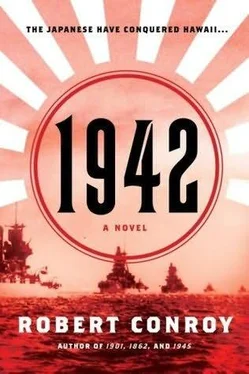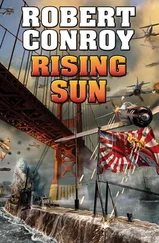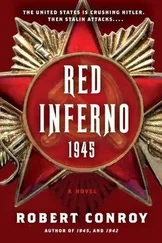Robert Conroy - 1942
Здесь есть возможность читать онлайн «Robert Conroy - 1942» весь текст электронной книги совершенно бесплатно (целиком полную версию без сокращений). В некоторых случаях можно слушать аудио, скачать через торрент в формате fb2 и присутствует краткое содержание. Жанр: Альтернативная история, на английском языке. Описание произведения, (предисловие) а так же отзывы посетителей доступны на портале библиотеки ЛибКат.
- Название:1942
- Автор:
- Жанр:
- Год:неизвестен
- ISBN:нет данных
- Рейтинг книги:5 / 5. Голосов: 1
-
Избранное:Добавить в избранное
- Отзывы:
-
Ваша оценка:
- 100
- 1
- 2
- 3
- 4
- 5
1942: краткое содержание, описание и аннотация
Предлагаем к чтению аннотацию, описание, краткое содержание или предисловие (зависит от того, что написал сам автор книги «1942»). Если вы не нашли необходимую информацию о книге — напишите в комментариях, мы постараемся отыскать её.
1942 — читать онлайн бесплатно полную книгу (весь текст) целиком
Ниже представлен текст книги, разбитый по страницам. Система сохранения места последней прочитанной страницы, позволяет с удобством читать онлайн бесплатно книгу «1942», без необходимости каждый раз заново искать на чём Вы остановились. Поставьте закладку, и сможете в любой момент перейти на страницу, на которой закончили чтение.
Интервал:
Закладка:
More bombs ripped the Hiryu, and other ships began to take hits. Japanese antiaircraft guns filled the sky with glowing tracers, but they seemed to do little harm. As before, they couldn’t shoot what they couldn’t see until the last minute.
As the attack thundered on, the Japanese gunnery did get better, and American planes started to fall in flames from the lightening sky. Several Americans attacked the Yamato, which, despite being protected by nearly 150 antiaircraft guns, had several bombs explode against her superstructure.
And then it was over. Fuchida stood on his crutches and wept. The Hiryu was a burning ruin, and so were his hopes of protecting the fleet with her planes. The Kaga and Soryu were also burning, although not as badly as the Hiryu.
Fuchida was about to say something to Watanabe when a tremendous explosion ripped through the Hiryu, sending a shock wave over the area and ripping all around her with metal debris.
Fuchida found himself lying on the ground several feet from where he had been sitting. Much of his uniform had been blown off, and now his other leg hurt like the devil. He saw a piece of bone sticking through the skin of his thigh.
Watanabe lay beside him, but Watanabe was dead. A piece of debris had decapitated him, and his head was nowhere to be seen.
Fuchida attempted to focus his dimming vision on the remains of the Hiryu. She had broken in half, and both ends were sinking toward the middle.
He tried to rise and felt hands pushing him back. “Be still, sir. Let us take care of you.”
The commander was helpless. Both his legs were broken, and he was having trouble both seeing and hearing. He gave in to the darkness that was engulfing him. “Poor Japan,” he murmured. “What have we done?”
Across the harbor and through the flames and clouds of smoke, Admiral Yamamoto watched the destruction of his dreams and the future of his nation. For a brief moment, he contemplated going off to some solitary place where he could commit suicide in accordance with the code of bushido. But the thought passed as he realized that intentional death was the coward’s way out. No, he had an obligation to his men and his nation to retrieve as much as he could from the debacle swirling about him.
Thus focused, he concentrated on the options yet available to him. First, it was appallingly obvious that Fuchida’s task of lifting planes from carriers and onto the land was doomed. The Hiryu was sinking, and at least two other carriers were damaged. While they might still be able to off-load a handful of planes, it would take too much time, which meant that this was no longer the solution. The fleet had to move out of the harbor through the channel, and that meant concentrating on towing out the hulk of the Akagi.
And he no longer had days in which to solve the problem. Instead, he had hours.
Judging from the sheer number of American planes in the most recent attack, there were at least two carriers, possibly more, in the vicinity of Oahu. Identification of the carriers they were from might come from interrogating shot-down pilots if any had survived, but it was almost irrelevant. Such knowledge would not come from Japanese floatplanes and flying boats. They were patrolling, but they were vulnerable and would be shot down by the next wave of attackers.
Yamamoto still had two carriers and the rest of the surface fleet intact. Several of those ships had sustained hits, but nothing severe. In particular, the Yamato had been struck by a pair of bombs and seemed to have brushed off the damage. If the remaining portion of the fleet could sortie out and do battle with the Americans, at least some of the shame could be washed away.
The attempt to remove the Akagi must be accelerated, despite the risks. The Americans would be returning to their floating bases to refuel and rearm. They would be back in the harbor in a matter of hours. Japanese gunners would put up a stout defense, but it was a given that bombers would get through to the ships if there were no planes to impede them. Thus, it was also true that each ship damaged or sunk reduced the number of Japanese guns, which made it easier for the attackers to get through the next time. It was, he mused, a spiral into hell. It had to be broken before the rest of the Japanese fleet was pounded to pieces.
But how had the American carriers appeared off Oahu at this precise time? Was German intelligence so slipshod as to mistake the presence of the Americans off Iceland? Or had the Germans betrayed their Asian allies to their white counterparts? Yamamoto decided he would write down his thoughts and have the message sent to Tokyo.
And how had the Americans known so far in advance as to be able to place their ships and planes in such an advantageous position? There were only three options: Treason, espionage, and the breaking of the Japanese codes. Of the three, he considered espionage the most likely. There were far too many people in Hawaii who had known in advance of his arrival. The information could have been stolen from them and sent to the United States via those damned guerrillas on Hawaii. That a Japanese citizen could have betrayed his country in favor of the Americans was unthinkable. So too was the idea that the Japanese codes had been broken.
At least the Americans on the Big Island would be eliminated. Colonel Omori had given his assurances in that regard.
CHAPTER 25
Lieutenant Goto was exhausted. It had been a long time since he’d been out in the field, and he was definitely out of shape. But at last they were driving the Americans before them like the animals they were.
Goto heard a noise and turned around. Captain Kashii had hacked the head off an American corpse. Kashii took the head and put it on the hood of his truck.
“Interesting hood ornament, isn’t it?” the captain asked with a cackle. “Not as exquisite as a Rolls-Royce’s, but it satisfies me.”
“Indeed,” said Goto. Kashii’s action confirmed Goto’s opinion that the disaster at Pearl Harbor had deranged the captain. Instead of being aggressive, Kashii’s actions had been wild and irrational. For instance, why did he insist on the troops returning to the trucks even for small advances? They had been ambushed while in such vulnerable columns, although the attacks seemed to have stopped since the last couple of marines had been killed.
The American marine Kashii had beheaded had been captured barely alive but had died while Goto was trying to extract information from him. From his papers, they learned that he’d been an officer. A shame he hadn’t told them anything.
They’d been able to get information from the local population fairly easily. The short trail from Hilo was littered with scores of dead and dying Hawaiians, whose agonies had motivated others to talk freely. Several villages, swollen with people who’d fled Hilo, were nearby, and the occupants had been easy to terrorize. As a result, they were closing in on the handful of Americans who remained on the loose. There weren’t more than a dozen left, and there were still more than three hundred Japanese chasing them. The end was inevitable. He only hoped that this Novacek would be captured alive, along with the woman who had so angered Colonel Omori.
Of course, some of the guerrillas would have scattered, but they would be found in short order. When it was over, Goto and Kashii could return to Hilo, although Goto wondered just what they’d be returning to. If the bad news coming from Pearl was even remotely correct, Japan was in danger of losing the Hawaiian Islands.
Goto thought this was almost beyond credibility. Japan did not go to war to be defeated. What had happened? It had to be betrayal, and it had to have come from the Americans they were chasing. If Japan was forced to quit Hawaii for a short while, it would not be the fault of the military.
Читать дальшеИнтервал:
Закладка:
Похожие книги на «1942»
Представляем Вашему вниманию похожие книги на «1942» списком для выбора. Мы отобрали схожую по названию и смыслу литературу в надежде предоставить читателям больше вариантов отыскать новые, интересные, ещё непрочитанные произведения.
Обсуждение, отзывы о книге «1942» и просто собственные мнения читателей. Оставьте ваши комментарии, напишите, что Вы думаете о произведении, его смысле или главных героях. Укажите что конкретно понравилось, а что нет, и почему Вы так считаете.












